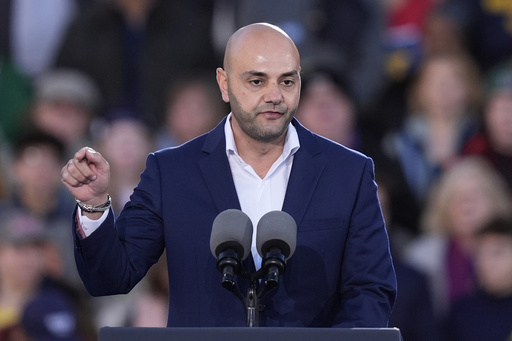
DEARBORN, Mich. — In a Lebanese restaurant not far from Detroit, bowls of labneh and platters of za’atar bread decorated the tables, yet the atmosphere was anything but festive, as attendees showed little enthusiasm for the meal. On one side were key representatives from Kamala Harris’s campaign, tasked with engaging the Arab American community. On the other were local leaders voicing their reasons for an increasing disillusionment with the Democratic Party, particularly regarding the ongoing war in Gaza.
“We have never felt so let down by this country as we do now,” said Nabih H. Ayad, chairman of the Arab American Civil Rights League. Ayad expressed deep disappointment, noting, “We wanted to give the Democratic Party a chance to act, but they haven’t.” He emphasized that the community cannot support actions perceived as genocide.
Nasrina Bargzie and Brenda Abdelal, representatives of Harris’s campaign focusing on outreach to Arab and Muslim voters, were present but remained largely silent during the heated discussions. As the prospect of Harris losing Michigan in the present election looms closer, these conversations highlight the vulnerabilities within her campaign. The Detroit region hosts a significant Arab American population, and fears are mounting over the potential impact of U.S. support for Israel as local Democrats worry about losing these crucial voters.
Many community members traditionally aligned with the Democratic Party now find themselves at a crossroads, faced with a dilemma: they can either express their disapproval of Harris for what they view as complicity in the deaths of over 43,000 Palestinians, as reported by Gaza’s Health Ministry, or they might risk the return of Donald Trump to the presidency, which they believe could exacerbate discrimination against their community.
At a campaign rally in Ann Arbor, the complexities of the situation became evident. Assad Turfe, one of the few Arab American elected officials openly supporting Harris, stated, “We need a leader who recognizes our struggles and will speak to our pain,” asserting that Harris fits this role. However, her speech was interrupted by pro-Palestinian protesters chanting, “How many kids have you killed today?” Acknowledging their concerns, Harris responded by expressing her desire for the conflict to end as soon as possible.
The uncertain political landscape leaves Harris in a precarious position. She has not articulated any significant shifts in U.S. policy regarding Israel and Gaza, raising skepticism among voters. In the previous election, Joe Biden carried Dearborn, a city with nearly half of its 110,000 residents being of Arab descent, by a substantial margin. Now Democrats worry that a portion of these voters might lean towards Trump or consider third-party alternatives such as Jill Stein.
U.S. Representative Ro Khanna from California, who facilitated the gathering at the Lebanese restaurant, remarked on the divided sentiment among voters, indicating some may still support Harris for the potential access she provides, while others might opt for abstaining from voting or choosing Stein. Trump has garnered support from some local Muslims, including endorsements from two Democratic mayors in cities with significant Muslim populations.
Trump asserts he will halt ongoing military conflicts and notes the diplomatic strides made during his administration, particularly through the Abraham Accords. Furthermore, he has criticized Harris for associating with former Representative Liz Cheney, known for her role in the Iraq War during her father’s vice presidency. Harris’s attempt to attract moderate Republicans could alienate some in the Arab American community.
Despite the mixed reactions to Trump’s endorsements, many Arab American leaders maintain a strong aversion to his past rhetoric, particularly his call for a total shutdown of Muslim entry into the U.S. and his imposition of travel restrictions affecting individuals from predominantly Muslim countries. Some argue that Trump has indicated he would allow Israel more latitude in its regional military engagements.
Turfe, a Lebanese American and Wayne County’s deputy executive, is among the few local leaders supporting Harris, a decision rooted in a desire to avoid a return to the political climate that worsened relations for their community following 9/11. He recounted the painful experiences his family endured when immigration agents disrupted their lives years ago, and he reflected on how political affiliations shifted in response to historical events.
The landscape further shifted following the October 7 Hamas attacks, which led to extensive conflict and significant loss of life. In response, pro-peace activists in Michigan have galvanized a movement within the Democratic primary to reflect opposition to ongoing military actions, manifesting over 100,000 “uncommitted” votes in the process.
While initially part of this “uncommitted” movement, Turfe voiced support for Harris after meeting her and sensing a personal connection. Despite his endorsement, he has faced backlash, including accusations of betrayal on social media and strained relations within the Dearborn community.
Suehaila Amen, a lifelong Democrat and local resident known for her role in a reality series spotlighting her community, expressed her discontent with Harris’s candidacy. She conveyed a sense of skepticism, feeling that the Democratic campaigners are now concerned about their potential losses in key districts. Amen simply stated that if Harris fails to secure the election, it may well be a reflection of her own choices.
During a recent speech in Oakland County, Harris acknowledged the distressing consequences of the conflict in Gaza, yet her policies regarding military support for Israel remain unchanged. This approach has led some to believe that her campaign is inadequate in addressing the concerns of the Arab American community.
As Khanna asserted in discussions with local leaders, Harris’s administration might bring Arab Americans into necessary discussions should Trump succeed, as her leadership could offer them representation that is crucial for their political future. Nevertheless, attendees like Mike Musheinesh, a Palestinian American business owner, articulated that engaging with Harris is essential, even if it means compromising their ideals.
Ultimately, the political climate is increasingly complex as Arab Americans assess their choices in light of recent events and the broader implications of their decisions come November.
